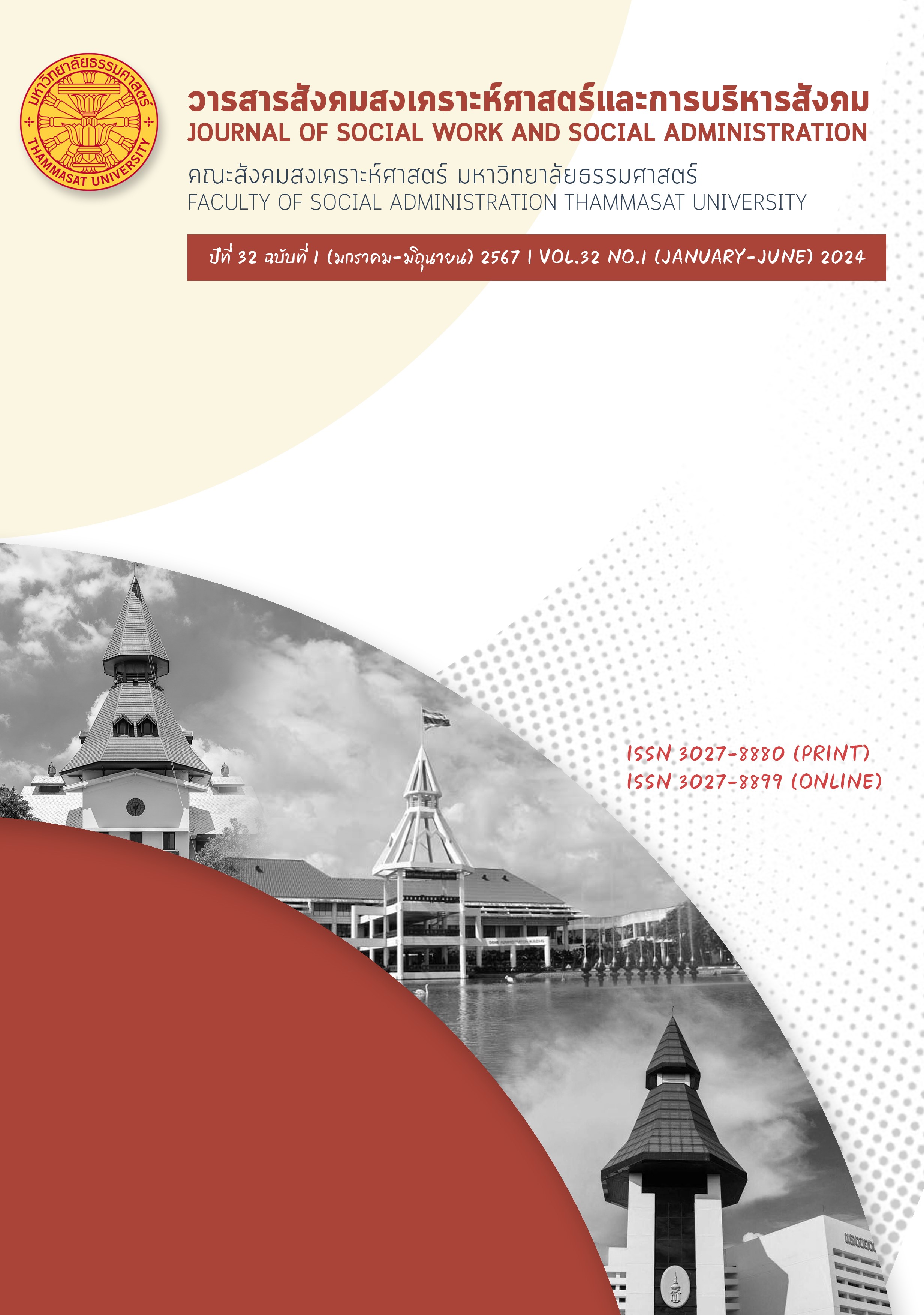Alternative Workfare to Enable Self-Employment: A Case Study of Hang Chat District, Lampang Province
Keywords:
Workfare, Productive welfare, Active labour marketAbstract
This article investigated the concept of enabling workfare to promote work and skill development. Qualitative research was conducted using survey data collected from five selected communities in Hang Chat District, Lampang Province. The results indicate that community welfare management relies on the community's ability to maintain autonomy and preserve its local identity. The implementation of flexicurity, which combines flexibility and security in community context. These findings emphasize the significance of workfare as an alternative approach to develop the community economy, a self-employment option leading to enabling workfare to boost occupational security and self-employed income, promoting human capital development, and providing proactive welfare emphasizing community productivity for local foundation development.
References
กิติพัฒน์ นนทปัทมะดุลย์. (2562). แนวคิดความมั่นคงทางภววิทยา: จุดกำเนิดและการประยุกต์ใช้. รายงานสืบเนื่องการสัมมนาวิชาการเนื่องในโอกาส
การสถาปนาคณะสังคมสงเคราะห์ศาสตร์ มหาวิทยาลัยธรรมศาสตร์ ครบรอบ 65 ปี. (หน้า 11-25). กรุงเทพฯ: คณะสังคมสงเคราะห์ศาสตร์ มหาวิทยาลัยธรรมศาสตร์.
กิติพัฒน์ นนทปัทมะดุลย์. (2563). สวัสดิการที่เน้นผลิตภาพและสวัสดิการที่เน้นการคุ้มครองกับการลดความเหลื่อมล้ำทางสังคม. รายงานสืบเนื่องการสัมมนาวิชาการคณะสังคมสงเคราะห์ศาสตร์ มหาวิทยาลัย ธรรมศาสตร์ ครบรอบ 66 ปีสังคมสงเคราะห์และสวัสดิการสังคม: การปลดล็อกความเหลื่อมล้ำสู่ความยั่งยืน, 24 มกราคม 2563 ณ คณะสังคมสงเคราะห์ศาสตร์ มหาวิทยาลัยธรรมศาสตร์. กรุงเทพฯ: บริษัทจรัลสนิทวงศ์การพิมพ์ จำกัด.
กฤษฎา ธีระโกศลพงศ์. (2562). รูปแบบของงานที่ไม่มีมาตรฐานและแรงงานที่มีความเสี่ยงในเศรษฐกิจแพลตฟอร์ม, วารสารรัฐศาสตร์และรัฐประศาสนศาสตร์ มหาวิทยาลัยขอนแก่น, 4(2): 59-108.
เกษรา ชัยเหลืองอุไร. (2557). การศึกษาเปรียบเทียบระบบสวัสดิการสังคมระหว่างประเทศไทยและประเทศสิงคโปร์. กรุงเทพฯ: สถาบันการต่างประเทศเทวะวงศ์วโรปการ กระทรวงการต่างประเทศ.
ชินชัย ชี้เจริญ. (2557). การพัฒนาระบบการช่วยเหลือทางสังคมของประเทศไทย. กรุงเทพฯ: กระทรวงการพัฒนาสังคมและความมั่นคงของมนุษย์.
นฤมล นิราทร. (2564). งาน ชีวิต และโรคระบาด: แรงงานนอกระบบในสถานการณ์โรคโควิด-19. เอกสารสืบเนื่องจากงานเวทีเสวนาวิชาการสาธารณะ, 24 เมษายน 2563 ณ สถาบันวิจัยสังคม จุฬาลงกรณ์มหาวิทยาลัย. กรุงเทพฯ.
นวลปราง อรุณจิต. (2562). Workfare: สวัสดิการทำงาน คำตอบการเปลี่ยนผ่านของประเทศไทย. รายงานสืบเนื่องการสัมมนาวิชาการคณะสังคมสงเคราะห์ศาสตร์ มหาวิทยาลัยธรรมศาสตร์ ครบรอบ 65 ปี สิทธิและความเสมอภาค: ความท้าทายของสังคมไทยในกระแสการเปลี่ยนผ่าน, 25 มกราคม 2562 ณ คณะสังคมสงเคราะห์ศาสตร์, มหาวิทยาลัยธรรมศาสตร์. กรุงเทพฯ: บริษัทจรัลสนิทวงศ์การพิมพ์ จำกัด.
ปรีดี หงษ์สต้น. (2564). ความยืดหยุ่นแต่มั่นคงของช่างไม้เดนมาร์กสมัยก่อน. สืบค้นจาก https://www.the101.world/flexicurity/
วรวรรณ ชาญด้วยวิทย์. (2562). การปรับระบบสวัสดิการสังคมพร้อมรับโลกใหม่ที่ผันผวน: สวัสดิการสำหรับแรงงานในระบบ. TDRI Annual Public Conference 2018, สืบค้นจาก https://tdri.or.th/2018/06/tdri-apc2018_session3/
สถาบันพัฒนาองค์กรชุมชน. (2565). การพัฒนาชุมชนเข้มแข็งพึ่งพาตนเองและเท่าทันต่อการเปลี่ยนแปลงโดยอาศัยการดำเนินงานอย่างบูรณาการ. สืบค้นจาก https://web.codi.or.th/wp-content/uploads/2022/ 03/AW_Upwebsite-วิจัยชุมชนเข้มแข็ง-OK.pdf
สราวุธ ไพฑูรย์พงษ์. (2562). Workfare จากประสบการณ์ของอเมริกา. มติชนออนไลน์, สืบค้นจาก https://www.matichon. co.th/columnists/news_1426406
สามชาย ศรีสันต์. (2559). วาทกรรมแนววิพากษ์และการศึกษาการพัฒนาในสังคมไทย. วารสารพัฒนศาสตร์, 13(1), 291-293.
สุรพล ปธานวนิช. (2547). นโยบายสังคม: เส้นทางสู่รัฐสวัสดิการ. กรุงเทพฯ: สำนักพิมพ์แห่งจุฬาลงกรณ์มหาวิทยาลัยธรรมศาสตร์.
สำนักงานสภาพัฒนาการเศรษฐกิจและสังคมแห่งชาติ. (2563). รายงานดัชนีความก้าวหน้าของคน ประจำปี 2562. กรุงเทพฯ: สภาพัฒนาการเศรษฐกิจและสังคมแห่งชาติ.
สำนักงานแรงงานจังหวัดลำปาง. (2561). รายงานสถานการณ์แรงงานจังหวัดลำปาง ปี 2561. สำนักงานแรงงานจังหวัดลำปาง.
อมรเทพ จาวะลา. (2555). สวัสดิการแบบ Workfare: บทเรียนจากต่างประเทศ. รายงานฉบับสมบูรณ์ โครงการวิจัยเรื่อง “ระบบการบริหารจัดการสวัสดิการแบบ Workfare”. กรุงเทพฯ: สถาบันวิจัยเพื่อการพัฒนาประเทศไทย.
Anderson, J. E. (1994). Public Policy-Making: Introduction (2nd). New York: Houghton Mifflin Company.
Chan, W. C, & Kinglun, N. (Eds). (2011). Welfare reform in East Asia: Towards Workfare?. New York: Routledge.
Deeming, C. (2015). Foundations of the Workfare State-Reflections on the Political Transformation of the Welfare State in Britain. Social Policy and Administration, 49(7). 862-886. DOI: 10.1111/spol.12096.
Dingeldey, I. (2007). Between workfare and enablement-The different paths to transformation of the welfare state: A comparative analysis of activating labour market policies. European Journal of Political Research, 46(6), 823-851. DOI: 10.1111/j.1475-6765.2007.00712.
Gough, I. (2007). Wellbeing and welfare regime in four countries. WeD International Conference, 28-30 June 2007. Bath: University of Bath.
Holliday, I. (2000). Productivist welfare capitalism: social policy in East Asia. Political Studies, 48(4), 706-723. DOI: 10.1111/1467-9248.0027.
Horn, A., Kevins, A., & Kersbergen, Kv. (2022). The paternalist politics of punitive and enabling workfare: evidence from a new dataset on workfare reforms in 16 countries, 1980–2015. Retrieved from https://academic.oup.com/ser/advance-article/doi/10.1093/ser/mwac060/6936686
Hudson, J., & Kühner, S. (2009). Towards productive welfare? A comparative analysis of 23 OECD countries. Journal of European Social Policy, 19(1), 34-46. DOI: 10.1177/0958928708098522
International Labour Organization. (2013). Resolution I: concerning statistics of work, employment and International Labour Organization-ILO. (2013). Report for discussion at the 19th International Conference of Labour Statisticians, 2-11 October 2013, Geneva: Department of Statistics.
Lødemel, I. (2001). Workfare in Six European Nations: Findings from evaluations and recommendations for future development. Fafo Institute for Applied Social Science 2001, Prepared for the Conference Welfare to Work in Europe and the US Fafo, October 5. 2001.
Gratton, L., & Ghoshal, S. (2003). Managing Personal Human Capital: New Ethos for the 'Volunteer' Employee. European Management Journal, Elsevier, 21(1), 1-10.
Madsen, P. K. (2001). Security and flexibility: friend or foes? some observations from the case of Denmark. (pp. 49-61) ILO and by ISSA, cf. Madsen (1999, 2002a and 2002b).
Mohr, L. B. (1969). Determinants of innovation in organizations. American Political Science Review, 63(3), 111-126.
Mestan, K. (2012). Examining changes to welfare policy: Paternalistic workfare in Australia and the UK. Ritrieved from https://researchbank.swinburne.edu.au/items/c6f076f5-6f01-4f8a-a552-2f465919bbb9/1/Kemran%20Mestan%20 Thesis.pdf?.vi=save
Peck, J. (2001). Workfare States. New York: Guilford Press.
Peck, J. (2003). The rise of the Workfare state. Kurswechsel 3.
Downloads
Published
How to Cite
Issue
Section
License
Copyright (c) 2024 Journal of Social Work and Social Administration

This work is licensed under a Creative Commons Attribution-NonCommercial-NoDerivatives 4.0 International License.
The manuscripts published in the Social Work Journal is the copyright of the Social Work Journal, Thammasat University
Any article or opinion appeared in the Social Work Journal will solely be under the responsibility of the author The Faculty of Social Administration, Thammasat University and the editors do not need to reach in agreement or hold any responsibility.



